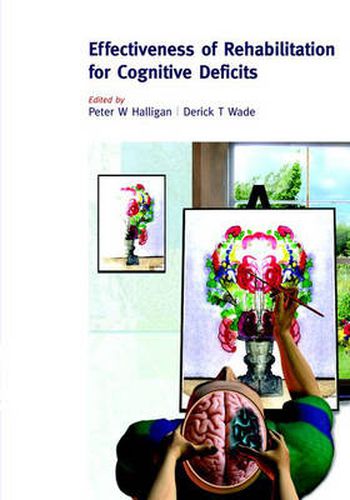Readings Newsletter
Become a Readings Member to make your shopping experience even easier.
Sign in or sign up for free!
You’re not far away from qualifying for FREE standard shipping within Australia
You’ve qualified for FREE standard shipping within Australia
The cart is loading…






Many patients with brain damage are left with a range of neuropsychological deficits that impair normal cognitive process. It is generally recognised that these less obvious cognitive deficits (including memory, language, perception, attention and executive disorders) militate against full recovery often to a greater extent than more traditional medical deficits (e.g. paralysis, sensory loss, etc). Recognition of this has helped fuel the exponential growth in cognitive neuropsychology and neuroscience over the past 30 years. In turn, this theoretical approach has been used to guide and inform the development of cognitive therapies designed to remediate cognitive impairments and their functional consequences. Cognitive rehabilitation has over the last decade grown to become an established and influential therapeutic approach. There is now a considerable body of knowledge describing the principles and theoretical basis for analysing and directing treatments to selective cognitive deficits. Despite this, the clinical effectiveness and extent to which cognitive theory can inform therapeutic treatment has been questioned. It is timely, therefore, to evaluate and discuss the type and quality of evidence used in support of cognitive rehabilitation. In this book, some of the most influential clinicians and cognitive neuroscientists in the world critically review and discuss the effectiveness of rehabilitation methods currently used to treat patients with cognitive impairments following acquired brain damage. It provides a much needed critique and consensus about what should constitute best practice. The book will be valuable for all those who have to deal with the neuropsychological and neurological effects of brain damage, including, neuropsychologists, neuropsychiatrists, neurologists, experimental pscyhologists, and neuroscientists.
$9.00 standard shipping within Australia
FREE standard shipping within Australia for orders over $100.00
Express & International shipping calculated at checkout
Many patients with brain damage are left with a range of neuropsychological deficits that impair normal cognitive process. It is generally recognised that these less obvious cognitive deficits (including memory, language, perception, attention and executive disorders) militate against full recovery often to a greater extent than more traditional medical deficits (e.g. paralysis, sensory loss, etc). Recognition of this has helped fuel the exponential growth in cognitive neuropsychology and neuroscience over the past 30 years. In turn, this theoretical approach has been used to guide and inform the development of cognitive therapies designed to remediate cognitive impairments and their functional consequences. Cognitive rehabilitation has over the last decade grown to become an established and influential therapeutic approach. There is now a considerable body of knowledge describing the principles and theoretical basis for analysing and directing treatments to selective cognitive deficits. Despite this, the clinical effectiveness and extent to which cognitive theory can inform therapeutic treatment has been questioned. It is timely, therefore, to evaluate and discuss the type and quality of evidence used in support of cognitive rehabilitation. In this book, some of the most influential clinicians and cognitive neuroscientists in the world critically review and discuss the effectiveness of rehabilitation methods currently used to treat patients with cognitive impairments following acquired brain damage. It provides a much needed critique and consensus about what should constitute best practice. The book will be valuable for all those who have to deal with the neuropsychological and neurological effects of brain damage, including, neuropsychologists, neuropsychiatrists, neurologists, experimental pscyhologists, and neuroscientists.